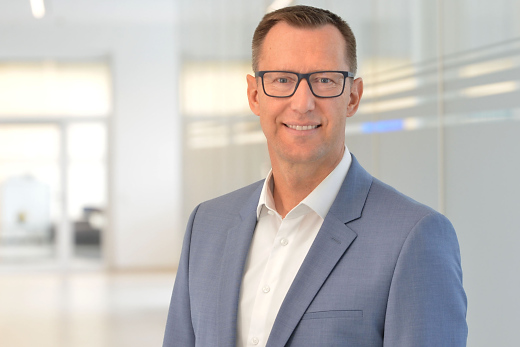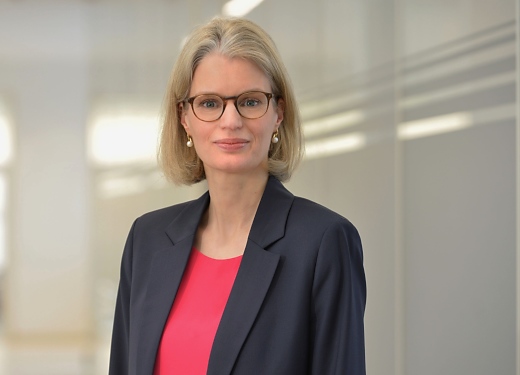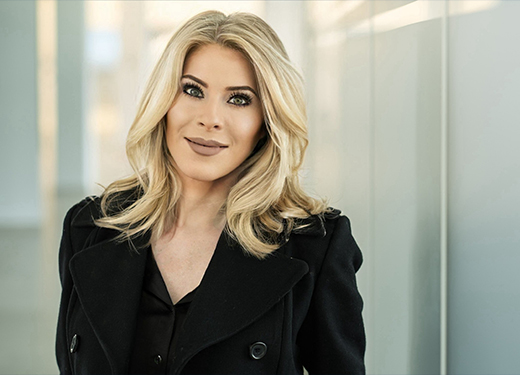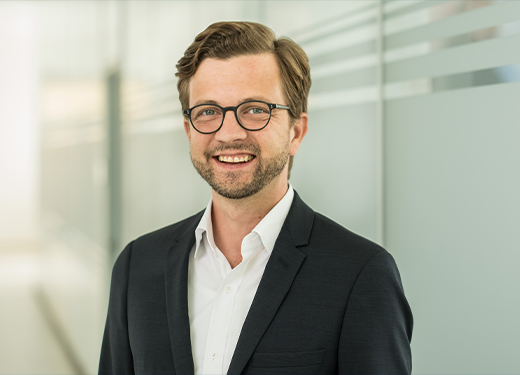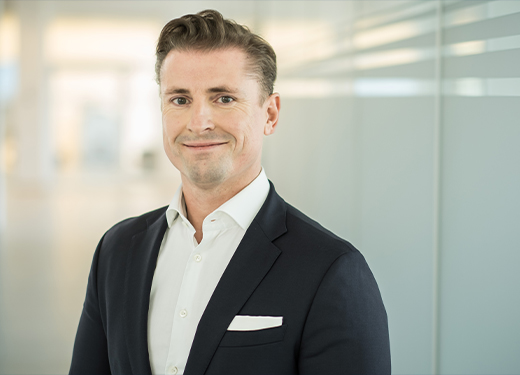- Excellent start to 2024 – Due to the excellent first quarter Group outlook raised for FY/24: Group organic revenue growth 4-7% and EBIT growth in constant currency 6-10% expected.
- Strategic portfolio measures concluded: Structured exit from Investment Company Vamed initiated.
- Strong organic growth in Group revenue of 6%1 to € 5.7 billion in Q1/24; Group EBIT increase in constant currency by 15% to € 633 million reflects the excellent performance of Operating Companies and the group-wide cost savings progressing ahead of plan.
- EPS increases: 11% in constant currency.
- Strong operating cash flow development at Fresenius Kabi driven by working capital efficiencies; Fresenius Helios expects catch-up of outstanding receivables in Germany in the course of the year.
- Fresenius Kabi shows excellent organic revenue growth of 9%2 and an improved EBIT margin at 15.1% in particular driven by the positive development of the Biopharma business.
- Biopharma business picking up: EBIT break-even in Q1/24.
- Fresenius Helios with solid organic revenue growth of 5%3 and EBIT margin of 11.1%; supported by phasing of energy related government relief funding in Germany and strong operating performance.
If no timeframe is specified, information refers to Q1/2024.
Michael Sen, CEO of Fresenius: “Fresenius has had an excellent start into the year, showing that our focus on Fresenius Kabi and Fresenius Helios is increasingly paying off. We are confident that we can maintain our growth momentum and are raising our outlook for the full year accordingly. With the exit from Vamed, our strategic portfolio restructuring has been completed as planned. Fresenius is already a simpler, stronger, and more innovative company due to the consistent implementation of #FutureFresenius. We now have even more opportunities to offer world-class therapies and improve people’s health.”
1 Organic growth rate adjusted for the divestment of the fertility services group Eugin, the hospital stake in Peru, and accounting effects related to Argentina hyperinflation
2 Organic growth rate adjusted for the accounting effects related to Argentina hyperinflation
3 Organic growth rate adjusted for the divestment of the fertility services group Eugin and the hospital stake in Peru.
An overview of the results for Q1/2024 - before and after special items – is available on our website.
Following the deconsolidation of Fresenius Medical Care, Group financial figures are presented in accordance with IAS 28 (at equity method) since December 1, 2023. The proportionate share of 32% of Fresenius Medical Care is presented as a separate line in Fresenius Group’s P&L and balance sheet. Dividends received from Fresenius Medical Care will also be reported as a separate line as part of the cash flow statement. Moreover, IAS 28 requires a full purchase price allocation (PPA). The accounting for the PPA is treated as special item. For reasons of simplification and comparability, Fresenius presents net income with and without Fresenius Medical Care`s equity result.
Information on the performance indicators are available on our website at https://www.fresenius.com/alternative-performance-measures.
Consolidated results for Q1/24 as well as for Q1/24 include special items. These concern: revaluations of biosimilars contingent purchase price liabilities, expenses associated with the Fresenius cost and efficiency program, transaction costs for mAbxience and Ivenix, costs in relation to the change of legal form of Fresenius Medical Care, the transformation of Fresenius Vamed, legacy portfolio adjustments, special items at Fresenius Medical Care, and expenses PPA equity method Fresenius Medical Care. The special items shown within the reconciliation tables are reported in the Corporate/Other segment.
Analyst conference call and Audio webcast
As part of the publication of the results for Q1/24, an analyst conference call will be held on May 8, 2024 at 1:30 p.m. CET (7:30 a.m. EST). All investors are cordially invited to follow the conference call in a live audio webcast at https://www.fresenius.com/investors. Following the call, a replay will be available on our website.
Group sales and earnings development
Group revenue increased by 4% (6% in constant currency) to €5,704 million (Q1/23: €5,546 million). Organic growth was 6%1 driven by an ongoing strong performance of our Operating Companies. Currency translation had a negative effect of 2% on revenue growth.
In Q1/24, revenue of the Operating Companies increased by 5% (7% in constant currency) to €5,216 million (Q1/23: €5,039 million).
Group EBITDA before special items increased by 13% (13% in constant currency) to €924 million (Q1/232: €828 million).
Group EBIT before special items increased by 15% (15% in constant currency) to €633 million (Q1/232: €554 million) mainly driven by the good earnings development at the Operating Companies and the continued progress of the groupwide cost savings program. The EBIT margin before special items was 11.1% (Q1/231: 10.0%). Reported Group EBIT was €559 million (Q1/23: €526 million).
The Operating Companies showed an 9% increase of EBIT before special items (9% in constant currency) to €631 million (Q1/232: €581 million) with an EBIT margin of 12.1% (Q1/232: 11.5%).
Group net interest before special items increased to -€115 million (Q1/232: -€87 million) mainly due to financing activities in a higher interest rate environment.
Group tax rate before special items was 24.5% (Q1/232: 24.4%).
Net income2 from deconsolidated Fresenius Medical Care operations before special items increased by 25% (33% in constant currency) to €60 million (Q1/232: €48 million).
Group net income3 before special items increased by 10% (11% in constant currency) to €429 million (Q1/231: €389 million). The increase was driven by the operating strength which outpaces higher interest.
1 Organic growth rate adjusted for the divestment of the fertility services group Eugin, the hospital stake in Peru, and accounting effects related to Argentina hyperinflation.
2 Before special items
3 Net income attributable to shareholders of Fresenius SE & Co. KGaA.
Group net income1 before special items excluding Medical Care increased by 8% (8% in constant currency) to €369 million (Q1/232: €341 million).
Reported Group net income1 decreased to €278 million (Q1/231: €346 million) Negative effects from the Purchase Price Allocation (PPA) and other negative special items at Fresenius Medical Care as well as the Vamed transformation had a negative impact on the Group net income income1.
Earnings per share1 before special items increased by 10% (11% in constant currency) to €0.76 (Q1/232: €0.69). Reported earnings per share1 were €0.49 (Q1/23: €0.61).
Group Cash flow development
Group operating cash flow was €2 million (Q1/23: €32 million). The first quarter is usually the softest in the course of the year. In Q1/24 the soft operating cash flow was mainly driven by temporarily higher working capital, in particular due to nursing budget related receivables built ups at Helios Germany. Group operating cash flow margin was 0.0% (Q1/23: 0.6%). Free cash flow before acquisitions, dividends and lease liabilities decreased to -€194 million (Q1/23: -€180 million). Free cash flow after acquisitions, dividends and lease liabilities improved to -€103 million (Q1/23: -€258 million).
Fresenius Kabi’s operating cash flow increased to €157 million (Q1/23: €21 million) with a margin of 7.7% (Q1/23: 1.1%) mainly driven by an improved working capital management.
Fresenius Helios’ operating cash flow decreased to -€117 million (Q1/23: €108 million) and was impacted by higher working capital in particular driven by temporary nursing budget related receivables built-ups at Helios Germany. The operating cash flow margin was -3.7% (Q1/23: 3.5%).
Fresenius Vamed’s operating cash flow improved to -€10 million (Q1/23: -€68 million) with a margin of -1.8% (Q1/23: -11.7%).
1 Before special items
2 For a detailed overview of special items please see the reconciliation tables at Financial Results | FSE (fresenius.com)
The cash conversion rate (CCR), which is defined as the ratio of adjusted free cash flow1 to EBIT before special items was 1.0 in Q1/24 (LTM) (Q1/23: 0.9 LTM). This positive development is due to the increased cash flow focus across the Group.
Group leverage
Group debt decreased by 8% (8% in constant currency) to €14,504 million
(Dec. 31, 2023: € 15,830 million) mainly related to the repayment of debt. Group net debt increased by 2% (2% in constant currency) to € 13,485 million (Dec. 31, 2023: € 13,268 million) which is mainly related to the cash flow development at Fresenius Helios, particularly driven by temporary receivables built ups related to the nursing budget at Helios in Germany.
As of March 31, 2024, the net debt/EBITDA ratio was 3.75x2,3 (Dec. 31, 2023: 3.76x3,4), a further reduction compared to Q4/23 and mainly driven by the good EBITDA development. Compared to Q1/23 (3.96x2,3,4) this is a 21 bps reduction.
Fresenius expects the net debt/EBITDA4 ratio to be within the self-imposed corridor of 3.0 to 3.5x by the end of 2024. This is expected to be driven by reducing net debt and by the operational performance at the Operating Companies.
ROIC increased to 5.5% in Q1/24 (Q1/23: 5.2%) mainly due to the EBIT improvement. The Operating Companies improved ROIC to 5.8% (Q1/23: 5.5%).
1 Cash flow before acquisitions and dividends; before interest, tax, and special items
2 At average exchange rates for both net debt and EBITDA; pro forma closed acquisitions/divestitures, including lease liabilities, including Fresenius Medical Care dividend
3 Before special items
4 At expected average exchange rates for both net debt and EBITDA; pro forma closed acquisitions/divestitures; excluding further potential acquisitions/divestitures; before special items; including lease liabilities, including Fresenius Medical Care dividend
For a detailed overview of special items please see the reconciliation tables at Financial Results | FSE (fresenius.com)
Cost savings program fully on track
The groupwide cost savings program progressed is fully on track. Under the program, Fresenius realized ~€25 million incremental structural cost savings at EBIT level in Q1/24. In the same period, one-time costs of ~€15 million incurred to achieve these savings.
Fresenius expects to achieve annual sustainable cost savings of ~€400 million at EBIT level by 2025. So far, Fresenius reached ~€305 million of cumulative structural cost savings. To reach this target, one-time costs between ~€80 and €100 million are anticipated between 2024 and 2025.
For 2024, total cost savings of ~€330 to €350 million are expected. This corresponds to incremental cost savings of ~€50 to €70 million in 2024 compared to 2023.
The programs continue to target all business segments and the Corporate Center. Key elements include measures to optimize sales and administrative costs, fostering digitalization as well as improve procurement processes.
Operating Company Fresenius Kabi
Revenue increased by 9% in constant currency (3% reported) to €2,051 million (Q1/23: €1,991 million). The reported revenue growth is mainly driven by negative currency translation effects related to the US dollar and the hyperinflation in Argentina. Organic growth was 9%1. This strong performance was driven in particular by the Biopharma business as well as by Nutrition.
Revenue of the Growth Vectors (MedTech, Nutrition and Biopharma) increased by 4% (14% in constant currency) to €1,089 million (Q1/23: €1,051 million). Organic growth was outstanding at 13%. In Nutrition, organic growth of 8% benefited from the good development in the US and was driven by many other international markets. Whereas China continued to be impacted by indirect effects of the government’s countrywide anti-corruption campaign and direct effects of the soft economy. Biopharma showed excellent organic growth of 117% driven by successful product launches in Europe and the US, as well as licensing agreements. MedTech showed organic growth of 1% given the high prior-year level.
Revenue in the Pharma (IV Drugs & Fluids) business increased by 2% (4% in constant currency; organic growth: 5%) and amounted to €962 million (Q1/23: €940 million). The solid organic growth was mainly driven by the positive development across many regions including the US.
1 Organic growth rate adjusted for accounting effects related to Argentina hyperinflation.
EBIT1 of Fresenius Kabi increased by 7% (8% in constant currency) to €310 million (Q1/23: €289 million) mainly due to the good revenue development, the EBIT break-even result of the Biopharma business, and ongoing progress of the cost saving initiatives. EBIT margin1 was 15.1% (Q1/23: 14.5%) and thus within the structural EBIT margin band.
EBIT1 of the Growth Vectors increased by 29% (constant currency: 17%) to €124 million (Q1/23: €96 million) due to the EBIT break-even result of the Biopharma business and the good revenue development. EBIT1 margin was 11.4% (Q1/23: 9.2%).
EBIT1 in the Pharma business increased 4% (constant currency: 6%) to €206 million (Q1/23: €197 million) due to the very well-progressing cost saving initiatives and the good revenue development. EBIT1 margin was 21.4% (Q1/23: 21.0%).
Operating Company Fresenius Helios
Revenue increased by 6% (5% in constant currency) to €3,184 million (Q1/23: €3,066 million). Organic growth was 5%.
Revenue of Helios Germany increased by 4% (in constant currency: 4%) to €1,903 million (Q1/23: €1,828 million), mainly driven by solid admissions numbers and favourable price effects. Organic growth was 4%.
Revenue of Helios Spain increased by 10% (8% in constant currency) to €1,281 million (Q1/23: €1,170 million) driven by ongoing strong activity levels and positive price effects. Organic growth was 7%2. The clinics in Latin America also showed a good performance.
1 Before special items
2 Growth rates adjusted for Argentina hyperinflation
For a detailed overview of special items please see the reconciliation tables at Financial Results | FSE (fresenius.com)
EBIT1 of Fresenius Helios increased by 14% (14% in constant currency) to €353 million (Q1/23: €311 million) with an EBIT margin2 of 11.1% (Q1/23: 10.1%).
EBIT of Helios Germany increased by 32% to €205 million (Q1/23: €155 million) with an EBIT margin of 10.8% (Q1/23: 8.5%) in particular driven by the phasing of the Government relief funding for higher energy costs as well as the good revenue development and the progressing cost savings program.
EBIT1 of Helios Spain decreased by 6% (7% in constant currency) to €149 million (Q1/23: €157 million). EBIT1 was impacted by the phasing due to the calendar variation related to the Easter week and related lower activities and mix effects as well as a high prior-year level. Despite the Easter effect, the EBIT margin1 was 11.6% (Q1/23: 13.4%).
As part of the portfolio optimization, the sale of the fertility services group Eugin was completed on January 31, 2024. The divestment of the majority stake in the hospital Clínica Ricardo Palma hospital in Lima, Peru, was completed on April 23, 2024. The sale marks Fresenius’ exit from the Peruvian hospital market.
Fresenius Vamed
Further progress was made in Q1/24 with the far-reaching restructuring program to increase Fresenius Vamed’s profitability which was initiated in 2023.
Revenue from continued business was €514 million in Q1/24. Organic growth of the continued business increased 1% driven by the positive development of the Services business offsetting the negative effects of the Project business. Total revenue of Fresenius Vamed was €561 million (Q1/23: €583 million) and declined by 4% (-4% in constant currency).
EBIT2 was at €2 million in Q1/24 (Q1/232: -€27 million), thus showing a significant year-over-year improvement and making it the third consecutive quarter of positive EBIT. The EBIT margin2 in Q1/24 was 0.4% (Q1/232: -4.6%).
1 Growth rates adjusted for the divestment of the fertility services group Eugin and the hospital stake in Peru.
For a detailed overview of special items please see the reconciliation tables at Financial Results | FSE (fresenius.com)
2 Before special items
The ongoing transformation resulted in negative special items of €47 million in Q1/24 mainly related to cessation of activities, asset re-evaluations and restructuring costs resulting in write-downs and provisions. The negative special items were predominantly booked as non-cash items.
Following the exit from Vamed, the company will no longer be a reporting segment of Fresenius as of Q2 2024.
Group and segment outlook for 20241
Fresenius raises its outlook for FY/24 based on the excellent first quarter and improved prospects for the ramainder of the year.
For 2024, Group organic revenue2 is now expected to grow between 4% to 7% (previous: 3% to 6%). Group constant currency EBIT1,3 is expected to grow in the rage of 6% to 10% (previous: 4% to 8%).
Fresenius Kabi now expects organic revenue growth in a mid-to high-single-digit percentage range in 2024 (previous: mid-single-digit percentage range). The EBIT margin1 is now expected to be in a range of 15% to 16% (previously: around 15%) (structural margin band: 14% to 17%).
Fresenius Helios expects organic revenue to grow in a low to mid-single digit percentage range in 2024. The EBIT margin1 is expected to be within the structural margin band of 9% to 11%.
The adjustment of the Group outlook also reflects the fact that the outlook is now provided without Fresenius Vamed, i.e. only for the Operating Companies Fresenius Kabi and Fresenius Helios. Following the announcement of the planned sale of Fresenius Vamed's rehabilitation business, Fresenius has initiated its structured exit from its Investment Company Fresenius Vamed.
1 For the prior-year basis please see table “Basis for Guidance for 2024”
2 2023 base: €20,307 million
3 2023 base: €2,266 million
This release contains forward-looking statements that are subject to various risks and uncertainties. Future results could differ materially from those described in these forward-looking statements due to certain factors, e.g. changes in business, economic and competitive conditions, regulatory reforms, results of clinical trials, foreign exchange rate fluctuations, uncertainties in litigation or investigative proceedings, the availability of financing and unforeseen impacts of international conflicts.
Fresenius does not undertake any responsibility to update the forward-looking statements in this release.
- PAI Partners ("PAI") to acquire controlling majority of 67 percent, Fresenius to retain 33 percent to participate in future upsides
- Fresenius continues to drive its portfolio optimization – further momentum in #FutureFresenius
- Sharpened focus on Operating Companies Fresenius Helios and Fresenius Kabi to drive growth
- Closing expected in the second half of the year
The global healthcare group Fresenius is continuing to drive its portfolio optimization. The company has reached an agreement with PAI for the sale of the majority of Vamed’s rehabilitation business. Upon completion of the transaction, PAI will become the majority owner of the new company with 67 percent, while Fresenius will retain 33 percent. The rehabilitation business comprises 67 facilities with 9,100 beds and around 9,500 employees (FTE) across Germany, Austria, Switzerland, the Czech Republic, and the UK. It has an enterprise value of €853 million. In 2023, it generated revenues of approximately €1 billion and was profitable. Closing is expected in the second half of 2024, subject to regulatory approval and the customary closing conditions. Approval of the transaction by a Vamed General Meeting where Fresenius holds a requisite 77 percent majority is expected shortly. The transaction follows last year’s announcement to focus on the Operating Companies Fresenius Kabi and Fresenius Helios.
“Building on the encouraging momentum of #FutureFresenius, the divestment is another milestone in our portfolio optimization. The rehabilitation franchise is a perfect fit for the new owner and will ensure the continuity of the business. For Fresenius it will reduce complexity and free up management capacity to further focus on our core and driving growth. Our full dedication at Fresenius is to advancing patient care globally,” said Michael Sen, CEO of Fresenius.
The rehabilitation business is Vamed’s largest business unit and offers a comprehensive range of healthcare services outside of Fresenius’ core focus areas. The business has strong competitive positions, but significant capex and management focus is required to realize its full value potential. As a stand-alone business and benefitting from PAI’s vast expertise in managing complex assets, the new company will be well positioned to meet the needs of its patients even better.
PAI is an international private equity firm that invests in market-leading companies globally. It has an extensive investment track record in the healthcare sector including DomusVi, a leading player in the European residential elderly care sector.
The announced transaction is integral to the ongoing realignment of Fresenius Vamed’s distinct businesses. Fresenius initiated an in-depth analysis of Vamed’s business model, its governance and relevant processes in 2023. At the same time, a comprehensive and far-reaching restructuring program was initiated with the clear goal of increasing Vamed’s profitability.
UBS is acting as financial advisor and Latham & Watkins is serving as legal advisor to Fresenius.
This release contains forward-looking statements that are subject to various risks and uncertainties. Future results could differ materially from those described in these forward-looking statements due to certain factors, e.g. changes in business, economic and competitive conditions, regulatory reforms, results of clinical trials, foreign exchange rate fluctuations, uncertainties in litigation or investigative proceedings, the availability of financing and unforeseen impacts of international conflicts. Fresenius does not undertake any responsibility to update the forward-looking statements in this release.
Fresenius has successfully completed the divestment of its stake in the hospital Clínica Ricardo Palma in Lima, Peru. The sale marks Fresenius’ exit from the Peruvian hospital market and is in line with the company’s announcement to divest certain assets as part of #FutureFresenius.
- Tyenne® is the first tocilizumab biosimilar by Fresenius Kabi, an operating company of Fresenius, with an intravenous and subcutaneous formulation approved by the FDA.
- The tocilizumab biosimilar provides increased access and an affordable, high-quality, and safe treatment option for U.S. patients.
- Encouraging trajectory of the (Bio)Pharma business in 2024 so far.
- The launch of the tocilizumab biosimilar contributes directly to growing Fresenius’ (Bio)Pharma platform, a substantial cornerstone of the #FutureFresenius strategy.
Fresenius, via its operating company Fresenius Kabi, announced today the immediate U.S. availability of Tyenne® (tocilizumab-aazg), a biosimilar of Actemra®** (tocilizumab). Tyenne®, for use in the treatment of chronic autoimmune diseases, is available in an intravenous (IV) formulation.
Michael Sen, CEO of Fresenius: “With the launch of Tyenne® in the U.S., we have reached another important milestone in accelerating our strong (Bio)Pharma momentum going into 2024. Growing this platform is a substantial cornerstone of our #FutureFresenius journey. Overall, we have seen an encouraging performance of our (Bio)Pharma business so far. We are particularly happy with the good progress of our majority-owned biotechnology company mAbxience and the traction of Tyenne®.”
Tyenne® is the first tocilizumab biosimilar with an intravenous and subcutaneous formulation approved by the FDA. The biosimilar received FDA approval on March 5, 2024. Tyenne® is Fresenius’ third approved biosimilar available in the U.S. and the second within its immunology portfolio. The biologic medicine is indicated for the treatment of several autoimmune diseases, including rheumatoid arthritis, giant cell arteritis, polyarticular juvenile idiopathic arthritis, and systemic juvenile idiopathic arthritis.
Pierluigi Antonelli, CEO of Fresenius Kabi: “Tyenne® will impact the treatment landscape for inflammatory and immune diseases in the U.S. Reaching ever more patients with our state-of-the-art biopharma portfolio signals a clear growth path in a highly promising market segment. We will continue to roll out our comprehensive pipeline of autoimmune and oncology biosimilars with several molecules in late-stage development.”
Supported by Fresenius Kabi’s holistic support program for health care professionals and patients, the company’s biologic medicine provides wider access to more treatment options and contributes to the viability of health care systems. Next to its two available biosimilars, Idacio®*** (adalimumab) and Stimufend®**** (pegfilgrastim), Fresenius Kabi has a growing pipeline of autoimmune and oncology biosimilars with several molecules in late-stage development.
To learn more about how Fresenius Kabi provides comprehensive patient support for Tyenne® in the U.S. please click here.
With #FutureFresenius, Fresenius successfully set the course last year to become a leading therapy-focused company. In line with the strategy, Fresenius has simplified its structure, is sharpening its focus by concentrating on its operating companies Fresenius Kabi and Fresenius Helios and is continuously enhancing its performance.
About Tyenne®, a Tocilizumab Biosimilar
Tyenne® (tocilizumab-aazg), a biosimilar to Actemra® (tocilizumab), is a prescription medicine called an Interleukin-6 (IL-6) receptor antagonist. It was developed by Fresenius Kabi using advanced analytical and manufacturing technologies for use in the treatment of several autoimmune diseases, including rheumatoid arthritis, giant cell arteritis, polyarticular juvenile idiopathic arthritis, and systemic juvenile idiopathic arthritis. Serious infections leading to hospitalization or death including tuberculosis (TB), bacterial, invasive fungal, viral, and other opportunistic infections have occurred in patients receiving the product. Tyenne® is contraindicated in patients with known hypersensitivity to tocilizumab products. For more information about Tyenne®, please see the full prescribing information for the U.S. here.
Tyenne® demonstrates Fresenius Kabi’s commitment to providing access to affordable and cost-effective biosimilars to more patients living with autoimmune diseases around the world while enabling savings for health care systems. KabiCare, Fresenius Kabi’s comprehensive patient support program, will be available to patients and health care providers in the U.S. from launch.
About Fresenius Kabi
Fresenius Kabi is a global healthcare company that specializes in lifesaving medicines and technologies for infusion, transfusion and clinical nutrition. The company’s products and services are used for the therapy and care of critically and chronically ill patients.
Its product portfolio comprises a range of highly complex biopharmaceuticals, clinical nutrition, medical technologies, and I.V. generic drugs. Within biopharmaceuticals, Fresenius Kabi offers, among others, biosimilar drugs with a focus on autoimmune diseases and oncology. The company’s clinical nutrition offering includes a wide selection of enteral and parenteral nutrition products. In the segment of medical technologies, its offering includes vital disposables, infusions pumps, apheresis machines, cell therapy devices, and more. Fresenius Kabi puts essential medicines and technologies in the hands of people who help patients and finds the best answers to the challenges they face.
Following its strategy “Vision 2026”, which is a key part of the #FutureFresenius program of the Fresenius healthcare group, the company is furthermore committed to increase efficiencies in the therapy and care of patients and improve access to high-quality healthcare around the globe. Fresenius Kabi aspires to be leading globally in its product segments – all for the benefit of patients, its customers, and its stakeholders.
*Tyenne® is a registered trademark of Fresenius Kabi Deutschland GmbH.
**Actemra® is a registered trademark of Chugai Seiyaku Kabushiki Kaisha Corp., a member of the Roche Group.
***Idacio® is a registered trademark of Fresenius Kabi Deutschland GmbH in selected countries
****Stimufend® is a registered trademark of Fresenius Kabi Deutschland GmbH in selected countries
This release contains forward-looking statements that are subject to various risks and uncertainties. Future results could differ materially from those described in these forward-looking statements due to certain factors, e.g. changes in business, economic and competitive conditions, regulatory reforms, results of clinical trials, foreign exchange rate fluctuations, uncertainties in litigation or investigative proceedings, the availability of financing and unforeseen impacts of international conflicts.
Fresenius does not undertake any responsibility to update the forward-looking statements in this release.
Members of the Fresenius Management Board purchased Fresenius shares with a total value of around €1.3 million over the past days as stipulated under the current compensation system. This underlines the commitment of the Management Board to drive the Company’s transformation at full speed. Fresenius is making strong progress in the Re-Vitalize phase of its journey towards #FutureFresenius. In 2024, which is expected to be a year of financial progression, the Company is focusing on deleveraging and pacing cost savings in order to build further earnings growth momentum and unlock value.
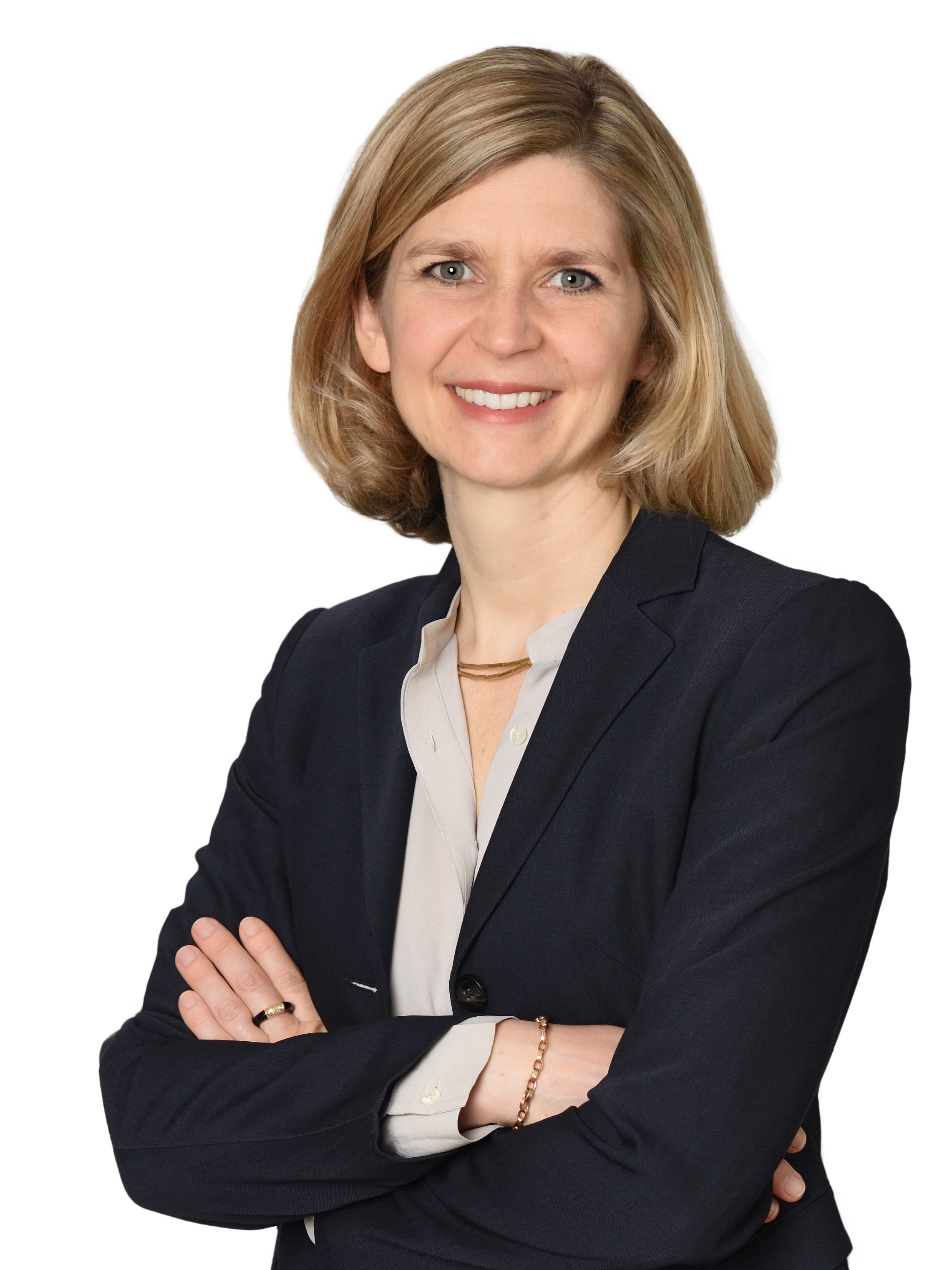
The Supervisory Board of Fresenius Management SE extended Sara Hennicken's mandate as Chief Financial Officer (CFO) ahead of time until 2027. Originally, it was set to run until 2025. The company thus ensures continuity on the Management Board in order to further advance the #FutureFresenius strategy.
Wolfgang Kirsch, Chairman of the Supervisory Board of Fresenius: “Sara Hennicken has successfully helped drive #FutureFresenius. In doing so, she has significantly improved the transparency in the finance function – this is an important prerequisite for managing the company and its businesses. We are very much looking forward to continuing our collaboration with her.”
Sara Hennicken (43) has been Chief Financial Officer of Fresenius since September 1, 2022. She joined the company in 2019 as Senior Vice President Global Treasury & Corporate Finance for Fresenius and Fresenius Medical Care. Prior to this, she worked in investment banking for 14 years, including nine years at Deutsche Bank. Most recently, Hennicken was Managing Director and Senior Client Executive in the Corporate Finance Coverage division. From 2005 to 2010, she worked for Citigroup in Frankfurt and London. Hennicken studied economics and business administration in Germany and the USA.
With its #FutureFresenius strategy, Fresenius is focusing on its operating companies Fresenius Kabi and Fresenius Helios. Both business segments occupy leading positions in attractive growth markets. With (Bio)Pharma, MedTech and Care Provision, they cover three central growth platforms in the therapy sector. To further increase the company's performance, the Management Board has also introduced a new, streamlined financial management system as a component of #FutureFresenius. Ambitious EBIT margin bands have been defined for the business segments as part of the Fresenius Financial Framework, which serve as benchmarks for management.
This release contains forward-looking statements that are subject to various risks and uncertainties. Future results could differ materially from those described in these forward-looking statements due to certain factors, e.g. changes in business, economic and competitive conditions, regulatory reforms, results of clinical trials, foreign exchange rate fluctuations, uncertainties in litigation or investigative proceedings, the availability of financing and unforeseen impacts of international conflicts.
Fresenius does not undertake any responsibility to update the forward-looking statements in this release.
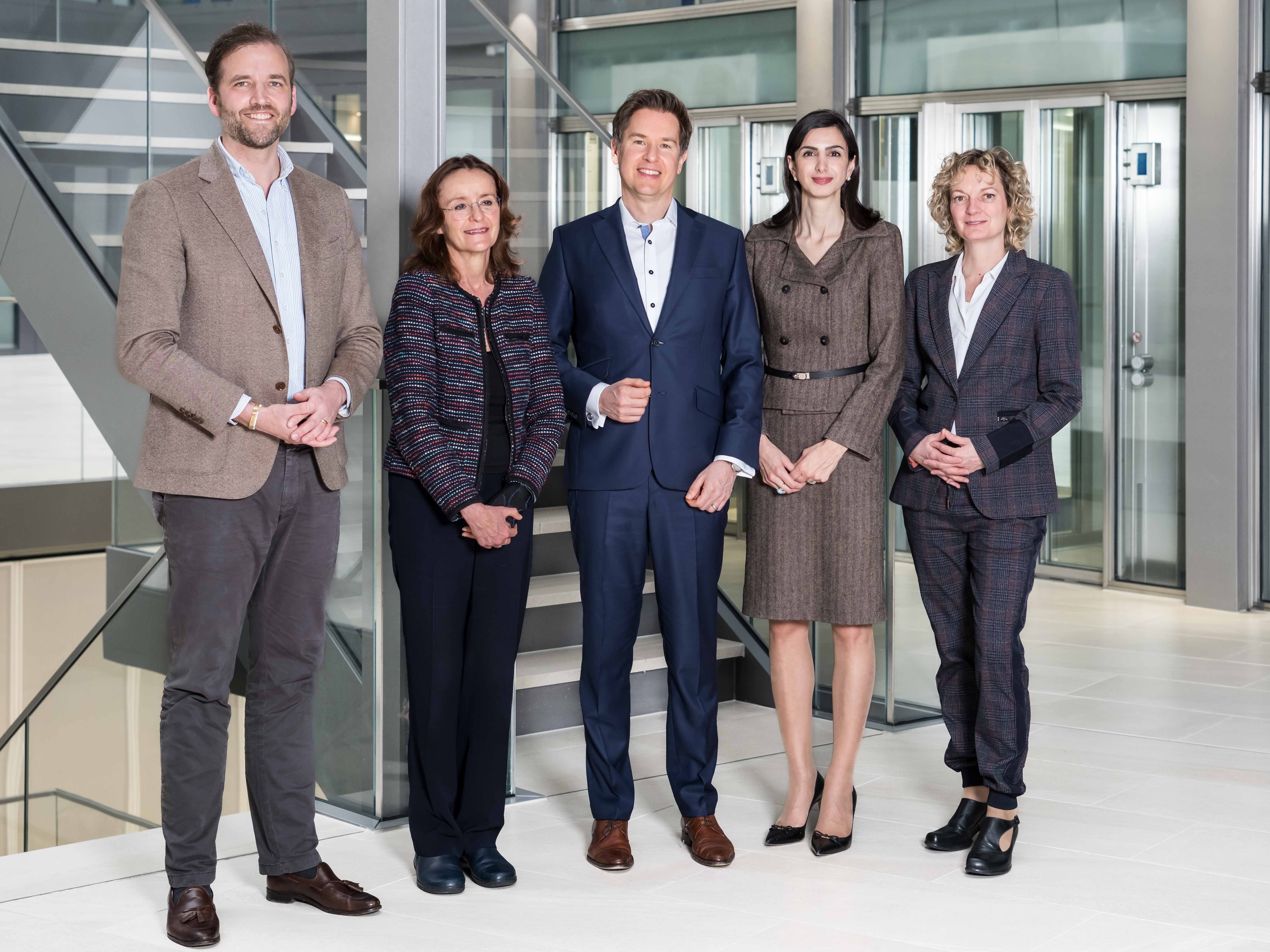
The Fresenius healthcare group has appointed an independent advisory board for sustainability issues. Four leading international experts from science, business, and consulting will in future support Fresenius in further development of its sustainability strategy. They will advise Michael Moser, who is the Management Board member responsible for environmental, social and governance (ESG).
"As a leading healthcare company, we contribute with our products and services to improving access to high-quality healthcare. We see it as our responsibility to lead by example when it comes to environment, social, and governance. Consistent further development of our ESG agenda is therefore an integral part of our #FutureFresenius strategy. This is how we fulfill our corporate purpose of advancing patient care," said Michael Sen, CEO of Fresenius.
"Together with the newly established sustainability advisory board, we are working on a concrete sustainability plan for the next five years. We want to set new priorities within the company and find answers to the most pressing questions of our time. I am very much looking forward to further expanding our expertise in this crucial area and to working together with leading as well as inspiring advisors," said Michael Moser.
The ESG Advisory Board is going to aid in developing the company’s ESG program further. Its members are extremely knowledgeable in Fresenius' key areas of action in the field of sustainability: from the design and implementation of health concepts and climate protection, through corporate sustainability principles, to future-oriented management and sustainable leadership as well as sustainability transformation.
Fresenius is making good progress in the area of sustainability: It reduced its CO2 emissions by 22 percent compared to the base year of 2020, for example. Fresenius is thus on track to halve its CO2 emissions by 2030 and to be climate neutral by 2040. In order to achieve health equity and enable equal opportunities in healthcare even more efficiently, Fresenius committed to the World Economic Forum's Zero Health Gaps Pledge at the beginning of the year. Fresenius thus commits, among other companies and organizations, to acting responsibly for equal opportunities in healthcare.
The ESG Advisory Board consists of the following members:
- Anahita Thoms (chairwoman): Anahita Thoms leads Baker McKenzie's international trade practice in Germany and is a member of the EMEA Steering Committee für Compliance & Investigations. She is Global Lead Sustainability Partner for the Industrials, Manufacturing & Transportation industry group. She holds a seat on the National Committee of UNICEF Germany and the Board of Atlantik-Brücke. She has also been a member of the German government's Sustainable Finance Advisory Committee and the American Bar Association's International Human Rights Steering Committee.
- Fiona Adshead: Fiona Adshead is the former Deputy Chief Medical Officer in the UK Government and a leading expert on sustainability and health. She currently chairs the Sustainable Healthcare Coalition, an organization that brings partners together to promote sustainable healthcare.
- Fabian Kienbaum: Fabian Kienbaum has been a managing partner in the third generation at Kienbaum since 2014 and has co-led the company together with Dr. Bibi Hahn since 2021. He focuses on advising family businesses on corporate governance and succession planning, and is the author of numerous publications on leadership and New Work.
- Prof. Judith Walls: Judith Walls is Chair of Sustainability Management and Director of the Institute for Economy and the Environment at the University of St. Gallen. She conducts research at the intersection between business and environmental sustainability.
This release contains forward-looking statements that are subject to various risks and uncertainties. Future results could differ materially from those described in these forward-looking statements due to certain factors, e.g. changes in business, economic and competitive conditions, regulatory reforms, results of clinical trials, foreign exchange rate fluctuations, uncertainties in litigation or investigative proceedings, the availability of financing and unforeseen impacts of international conflicts.
Fresenius does not undertake any responsibility to update the forward-looking statements in this release.
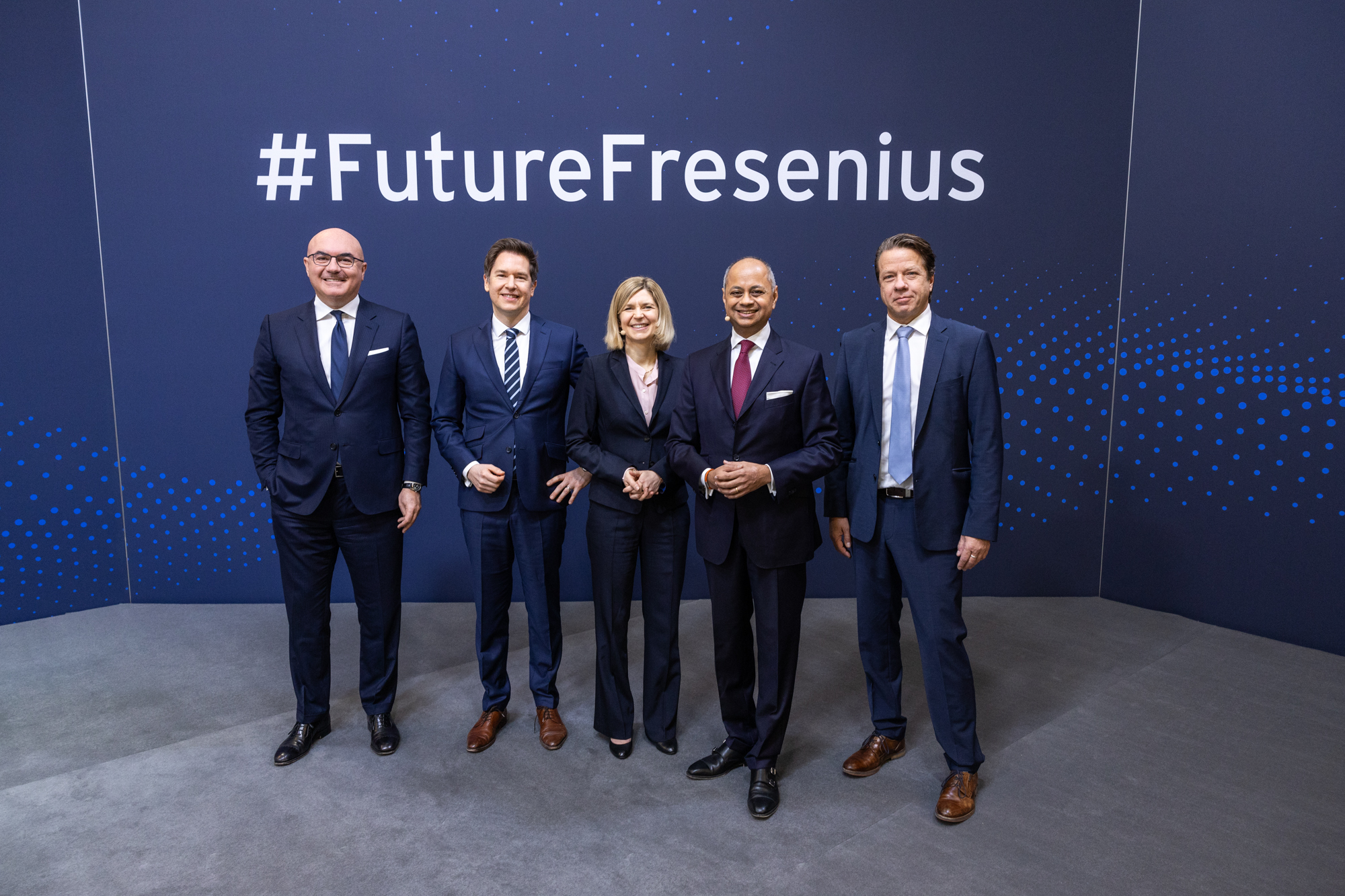
- Fresenius achieves the raised outlook for FY/23. Strong final quarter with continued good development of the Operating Companies Fresenius Kabi and Fresenius Helios and progress in the turnaround of the Investment Company Fresenius Vamed.
- Group 2024 outlook: Organic revenue growth expected between 3% and 6%; EBIT expected to grow between 4% and 8%.
- Leverage ratio declines: expected to be within the self-defined target corridor of 3.0x to 3.5x by the end of 2024.
- Revenue of €22.3 billion in FY/23: Strong organic Group revenue growth of 6%; Group EBIT increased 2% in constant currency to €2.3 billion; excellent Group operating cash flow totaled €2.1 billion.
- Group cost savings target for 2023 with ~40 % significantly exceeded – FY/25 structural productivity savings target raised to ~€400 million at EBIT level (before: ~€350 million).
- Group revenue increased organically by 5% in Q4; Group EBIT increased by 8% in constant currency.
- Fresenius Kabi with excellent organic revenue growth of 7% in Q4 at top-end of structural growth band and EBIT margin of 14.1% within structural band.
- Fresenius Helios with strong organic revenue growth of 5% in Q4 at top-end of structural growth band and excellent EBIT margin of 11.6 % well above structural margin band.
- Fresenius Vamed’s transformation progressing well; ongoing operational improvement with positive EBIT second consecutive quarter.
- Deconsolidation of Fresenius Medical Care together with many structural improvements in the context of #FutureFresenius implemented in 2023; one-off, non-cash special effects reported in 2023.
If no timeframe is specified, information refers to Q4/2023.
Michael Sen, CEO of Fresenius: “We took decisive actions in fiscal year 2023 and put Fresenius back on track. #FutureFresenius is driving improvements throughout the company and creating value. We added focus, simplified the structure, and delivered better financial performance. We will build on that momentum to further grow our businesses and accelerate earnings growth driven by the Operating Companies Fresenius Kabi and Fresenius Helios. Fresenius is uniquely positioned to address the rising demand for healthcare leveraging innovations also in digitalization and AI. We are deepening our purpose of Advancing Patient Care.”
An overview of the results for Q4/2023 and the 2023 financial year – before and after special items – is available on our website.
Following the deconsolidation of Fresenius Medical Care Group financial figures have been presented in accordance with IAS 28 (at equity method) since December 1, 2023. Prior-year figures have been adjusted due to the application of IFRS 5 to the deconsolidated operations of Fresenius Medical Care.
Information on the performance indicators are available on our website at https://www.fresenius.com/alternative-performance-measures.
Conference call and video webcast
As part of the publication of the results for FY/23, a press conference will be held on February 21, 2024 at 10:00 a.m. CET. You are cordially invited to follow the press conference in a live online broadcast at https://www.fresenius.com/calendar. Following the conference, a recording will be available on our website.
Consolidated results for FY/23 as well as for FY/22 in-clude special items. These concern: revaluations of biosimilars contingent purchase price liabilities, expenses associated with the Fresenius cost and efficiency program, impacts related to the war in Ukraine, transaction costs for mAbxience and Ivenix, hyperinflation in Turkey, retroactive duties, costs in relation to the change of legal form of Fresenius Medical Care, the transformation of Fresenius Vamed, legacy portfolio adjustment, effects from the valuation of the investment in Fresenius Medical Care in ac-cordance with IFRS 5, and expenses PPA equity method Fresenius Medical Care. The special items shown within the reconciliation tables are reported in the Corporate/Other segment.
2024 Strategic priorities
After a year of significant structural progression in the Group and improved operating performance, Fresenius’ priorities in 2024 will focus on financial progression. This includes driving down leverage, execute on raised cost savings target and a rigorous focus on capital efficiency and returns. This bundle of measures is expected to translate into accelerated earnings growth in 2024 and beyond.
Fresenius is uniquely positioned to benefit from the mega trends of the healthcare sector, including growing and ageing populations, and digitalization. With its leading position in the European private hospital market and at a vast number of ambulatory clinics, the company has direct access to about 26 million patients. In addition, innovative MedTech devices and an integrated end-to-end Biopharma platform enable crucial therapies for the future. These strong platforms form a highly robust, earnings-enhancing business model in attractive growth areas.
Group business development
Group revenue remained nearly unchanged (4% increase in constant currency) at €5,678 million (Q4/22: €5,670 million). Organic growth was 5% driven by an ongoing strong performance of our Operating Companies. Divestitures reduced revenue growth by 1%. Currency translation had a negative effect of 4% on revenue growth. In FY/23, Group revenue increased by 4% (6% in constant currency) to €22,299 million (FY/22: €21,532 million). Organic growth was 6%. Currency translation decreased revenue growth by 2%.
In Q4/23, the revenue of the Operating Companies increased by 2% (7% in constant currency) to €5,165 million (Q4/22: €5,047 million). In FY/23, revenue of the Operating Companies increased by 4% (7% in constant currency) to €20,255 million (FY/22: €19,494 million).
Group EBITDA before special items increased by 6% (4% in constant currency) to €942 million (Q4/221: €890 million). In FY/23, Group EBITDA before special items increased by 3% (3% in constant currency) to €3,422 million (FY/221: €3,315 million).
Group EBIT before special items increased by 13% (8% in constant currency) to €634 million (Q4/221: €559 million) mainly driven by the good earnings development at the Operating Companies and the progress of the operational turnaround at Fresenius Vamed. The EBIT margin before special items was 11.2% (Q4/221: 9.9%). Reported Group EBIT was €85 million (Q4/22: €337 million). In FY/23 Group EBIT before special items increased by 3% (2% in constant currency) at €2,262 million (20221: €2,190 million). The EBIT margin before special items was 10.1% (20221: 10.2%). Reported Group EBIT was €1,143 million (2022: €1,812 million).
The Operating Companies showed an 8% increase of EBIT before special items (2% in constant currency) to €613 million (Q4/221: € 568 million) with an EBIT margin of 11.9% (Q4/221: 11.3%). In FY/23, the EBIT before special items of the Operating Companies increased by 5% (4% in constant currency) to €2,278 million (FY/221: €2,170 million) with an EBIT margin of 11.2% (FY/221: 11.1%).
Group net interest before special items increased to -€118 million (Q4/221: -€80 million) mainly due to financing activities in a higher interest rate environment. In FY/23, Group net interest before special items increased to -€418 million (20221: -€241 million).
Group tax rate before special items was 36.4% (Q4/221: 23.2%). The higher tax rate in Q4/23 is mainly due to the closing of tax audit procedures as well as a valuation adjustment of a deferred tax asset in Germany. In FY/23, the Group tax rate before special items was 28.3% (20221: 22.4%).
1 Before special items
For a detailed overview of special items please see the reconciliation tables at Financial Results | FSE (fresenius.com)
Net income1 from deconsolidated Fresenius Medical Care operations before special items remained unchanged (4% increase in constant currency) at €83 million (Q4/222: €83 million). In FY/23 net income1 from deconsolidated Fresenius Medical Care operations before special items decreased by 18% (-16% in constant currency) to €243 million (20222: €295 million).
Group net income1 before special items decreased by 11% (-17% in constant currency) to €397 million (Q4/222: €445 million). The decrease was mainly driven by rising interest expenses and a higher tax rate. Reported Group net income1 decreased to -€614 million (Q4/22: €255 million) and mainly results from the valuation effect of Fresenius Medical Care in accordance with IFRS 5 in the amount of €521 million (see “Deconsolidation of Fresenius Medical Care”). The effect has no cash impact. Furthermore, legacy portfolio adjustments and expenses for the cost and efficiency program, and the Vamed transformation had a negative impact on the Group net income income1. Group net income1 before special items excluding Medical Care decreased by 13% (-22% in constant currency) to €314 million (Q4/222: €362 million).
In FY/23, Group net income1 before special items decreased by 13% (-14% in constant currency) to €1,505 million (20222: €1,729 million). The decrease was driven by rising interest costs and a higher tax rate. Reported Group net income1 decreased to -€594 million (2022: €1,372 million) and was negative mainly due to the Fresenius Medical Care’s valuation effects according to IFRS 5 of €1,115 million (see chapter “Deconsolidation of Fresenius Medical Care” on page 11). These effects have no cash impact. Furthermore, expenses in connection with the Vamed transformation, legacy portfolio adjustments as well as expenses for the cost and efficiency program had a negative impact on the Group net income1. Group net income1 before special items excluding Medical Care decreased by 12% (-14% in constant currency) to €1,262 million (20222: €1,434 million).
1 Net income attributable to shareholders of Fresenius SE & Co. KGaA
2 Before special items
Earnings per share1 before special items decreased by 11% (-17% in constant currency) to €0.70 (Q4/222: €0.79). Reported earnings per share1 were -€1.09 (Q4/22: €0.45). In FY/23, earnings per share1 before special items decreased by 13% (-15% in constant currency) to €2.67 (FY/222: €3.08). Reported earnings per share1 were -€1.05 (FY/22: €2.44).
Group operating cash flow increased by 4% to €1,272 million (Q4/22: €1,225 million) mainly driven by the strong cash flow development across the Group. Group operating cash flow margin was 22.4% (Q4/22: 21.6%). Free cash flow before acquisitions, dividends and lease liabilities increased to €888 million (Q4/22: €822 million). Free cash flow after acquisitions, dividends and lease liabilities increased to €814 million (Q4/22: €742 million).
In FY/23, Group operating cash flow increased by 5% to €2,131 million (FY/22: €2,031 million) with a margin of 9.6% (2022: 9.4%). Free cash flow before acquisitions, dividends and lease liabilities increased to €1,024 million
(FY/22: €942 million). Free cash flow after acquisitions, dividends and lease liabilities improved to €115 million (FY/22: -€317 million).
Fresenius Kabi’s operating cash flow increased by 46% to €434 million (Q4/22: €298 million) with a margin of 21.7% (Q4/22: 14.6%) mainly driven mainly driven by an improved working capital management. In FY/23, operating cash flow increased by 21% to €1,015 million (2022: €841 million) with a margin of 12.7% (FY/22: 10.7%).
Fresenius Helios’ operating cash flow decreased by 9% to €867 million (Q4/22: €956 million) mainly due to phasing effects of receivables in Spain and the very strong cash flow in the prior year. The operating cash flow margin was 27.2% (Q4/22: 31.5%). In FY/23, operating cash flow decreased by 9% to €1.244 million (FY/22: €1.367 million) with a margin of 10.1% (FY/22: 11.7%).
Fresenius Vamed’s operating cash flow increased to €36 million (Q4/22: €12 million) with a margin of 6.1% (Q4/22: 1.7%) due to positive phasing effects. In FY/23, operating cash flow improved to €20 million (2022: -€44 million) with a margin of 0.8% (2022: -1.9%).
1 Net income attributable to shareholders of Fresenius SE & Co. KGaA
2 Before special items
The cash conversion rate (CCR), which is defined as the ratio of adjusted free cash flow1 to EBIT before special items was 1.0 in FY/23 (2022: 0.9). This positive development is due to the increased cash flow focus across the Group including inventory management, working capital management and cash collection.
Group debt increased by 8% (8% in constant currency) to €15,830 million
(Dec. 31, 20222: € 14,708 million). Group net debt remained broadly flat at € 13,268 million (Dec. 31, 20222: € 13,307 million). In constant currency, Group net debt decreased by 1%.
As of December 31, 2023, the net debt/EBITDA ratio was 3.76x3,4 (Dec. 31, 2022: 3.80x2,3,4). This is a strong 27 bps reduction compared to Q3/23 (4,03x3,4) and is mainly driven by the good cash flow development in Q4/23.
Fresenius expects the net debt/EBITDA5 ratio to be within the self-imposed corridor of 3.0 to 3.5x by the end of 2024. This is expected to be driven by reducing net debt and by the operational performance at the Operating Companies.
This assumption does not include further potential divestment activities, however, includes the fact that due to legal restrictions as a result of the use of government compensation and reimbursement payments for increased energy costs provided for in the Hospital Financing Act, however, Fresenius will not propose to the 2024 Annual General Meeting to distribute a dividend for the 2023 fiscal year. Irrespective of the legally required suspension of dividend payments for the 2023 fiscal year, Fresenius will maintain its progressive dividend policy in the future and continues to aim to increase the dividend in line with growth in earnings per share (in constant currency, before special items), or at least maintain the dividend at the previous year's level.
1 Cash flow before acquisitions and dividends; before interest, tax, and special items
2 Proforma deconsolidation Fresenius Medical Care
3 At average exchange rates for both net debt and EBITDA; pro forma closed acquisitions/divestitures, including lease liabilities, including Fresenius Medical Care dividend
4 Before special items
5 At average exchange rates for both net debt and EBITDA; pro forma closed acquisitions/divestitures; excluding further potential acquisitions/divestitures; before special items; including lease liabilities, including Fresenius Medical Care dividend
ROIC was 5.2% in FY/23 (FY/22: 5.6%) mainly due to the higher tax rate. The Operating Companies showed a ROIC of 5.6%.
Structural productivity targets significantly exceeded – 2025 target raised
The groupwide cost savings program progressed well ahead of plan. Within the program, Fresenius realized ~€280 million of structural cost savings at EBIT level in FY/23. With that, the originally anticipated saving of ~€200 million for FY/23 was significantly exceeded. In the same period, one-time costs of ~€220 million were incurred to achieve these savings.
Due to the excellent progress of the measures implemented across the entire Group, Fresenius raises its target for the second time. Fresenius now expects to achieve annual sustainable cost savings of ~€400 million at EBIT level by 2025 (before: ~€350 million). To reach this new target, one-time costs between ~€80 and €100 million are anticipated between 2024 and 2025. For 2024, total cost savings of ~€330 to €350 million are expected. This corresponds to incremental cost savings of ~€50 to €70 million compared to 2023.
The targeted programs involve all business segments and the Corporate Center. Key elements include measures to optimize procurement, processes, sales and administrative costs, as well as fostering digitalization.
Operating Company Fresenius Kabi
Revenue decreased by 2% (increased 9 % in constant currency) to €1,996 million (Q4/22: €2,036 million) mainly driven by negative currency translation effects relating to the US dollar and the hyperinflation in Argentina. Organic growth was 7% . This strong performance was mainly driven by the strong business development of all Growth Vectors. In FY/23, revenue increased by 2% (9% in constant currency) to €8,009 million (2022: €7,850 million). Organic growth was 7%1.
1 To show the underlying business development, the organic growth definition was adjusted to fully exclude the significant inflation accounting effects in Argentina. According to the previous methodology, organic growth for Fresenius Kabi would have been Q1: 7%, Q2: 8%, Q3:7%, Q4: 14% and FY/23: 9%
Revenue of the Growth Vectors (MedTech, Nutrition and Biopharma) decreased by 3% to €997 million (Q4/22: €1,026 million) driven by negative currency exchange effects (increased 14% in constant currency). Organic growth was outstanding at 11%. In Nutrition, organic growth of 6% was driven by the good development in the US and Latin America whereas China was impacted by indirect effects of the government’s countrywide anti-corruption campaign. Biopharma showed very strong organic growth of 66% driven by successful product launches in Europe and the US, as well as licensing agreements. MedTech had excellent organic growth of 8% driven by a broad-based positive development across most regions and many product groups. In FY/23, the revenue of the Growth Vectors increased by 4% (14% in constant currency; organic growth: 10%) to €4,177 million (FY/22: €4,005 million).
Revenue in the Pharma (IV Drugs & Fluids) business decreased by 1% (increased 3% in constant currency; organic growth: 3%) and amounted to €1,000 million (Q4/22: €1,010 million). The solid organic growth was mainly driven by a positive development across many regions. In FY/23, revenue in the Pharma business remained broadly stable (increased 3% in constant currency; organic growth: 3%) and amounted to €3,832 million (2022: €3,845 million).
EBIT1 of Fresenius Kabi increased by 19% (6% in constant currency) to €282 million (Q4/22: €236 million) due to the good revenue development and the well-progressing cost saving initiatives. EBIT margin1 was 14.1% (Q4/22: 11.6%) and thus within the structural EBIT margin band. In FY/23, EBIT1 increased by 6% (constant currency: 3%) to €1,145 million (FY/22: €1,080 million). EBIT margin1 was 14.3% (FY/22: 13.8%).
EBIT1 of the Growth Vectors increased by 69% (constant currency: 12%) to €102 million (Q4/22: €60 million) due to the excellent revenue development and the very well-progressing cost saving initiatives. EBIT1 margin was 10.2% (Q4/22: 5.9%). In FY/23, EBIT1 of the Growth Vectors increased by 15% (constant currency: 6%) to €390 million (FY/22: €339 million) with a margin1 of 9.3% (FY/22: 8.5%).
EBIT1 in the Pharma business remained nearly stable (increased 2% in constant currency) to €189 million (Q4/22: €190 million) due to the very well-progressing cost saving initiatives. EBIT1 margin was 18.9% (Q4/22: 18.8%). In FY/23, EBIT1 in the Pharma business increased by 3% (constant currency: 6%) to €792 million (FY/22: €769 million) with a margin of 20.7% (FY/22: 20.0%).
1 Before special items
Operating Company Fresenius Helios
Revenue increased by 5% (5% in constant currency) to €3,188 million (Q4/23: €3,031 million) Organic growth was 5%. In FY/23, revenue increased by 5% (5% in constant currency) to €12,320 million (FY/22: €11,716 million). Organic growth was 5%.
Revenue of Helios Germany increased by 5% (organic growth: 5%) to €1,828 million (Q4/22: €1,749 million), mainly driven by solid admissions numbers. In FY/23, revenue of Helios Germany increased by 4% (organic growth: 4%) to €7,279 million (FY/22: €7,021 million).
Revenue of Helios Spain increased despite the already strong prior year quarter by 6% (5% in constant currency) to €1,289 million (Q4/22: €1,214 million) driven by ongoing strong activity levels. The clinics in Latin America also showed a good performance. Organic growth was 5%. In FY/23, revenue of Helios Spain increased by 7% (8% in constant currency, organic growth: 8%) to €4,770 million (FY/22: €4,441 million).
Revenue of Helios Fertility increased by 8% (17% in constant currency) to €71 million (Q4/22: €66 million) driven by favorable price and mix effects as well as the positive development of activity levels, especially in the US. Organic growth was 22%. In FY/23, revenue of Helios Fertility increased by 8% (14% in constant currency) to €269 million (FY/22: €250 million).
EBIT1 of Fresenius Helios increased by 5% (5% in constant currency) to €371 million (Q4/22: €354 million) with an EBIT margin1 of 11.6% (Q4/22: 11.7%). In FY/23, EBIT1 increased by 4% (increased 4% in constant currency) to €1,232 million (2022: €1,185 million) with an EBIT margin1 of 10.0% (2022: 10.1%).
EBIT1 of Helios Germany decreased by 6% to €164 million (Q4/22: €174 million) with an EBIT margin1 of 9.0% (Q4/22: 9.9%) in particular due to the high prior-year basis. The prior-year quarter was not affected by any major negative inflation effects, which, however, had a significant negative impact on Q4/23. This could not be fully compensated despite the good revenue development as well as the progressing cost savings program and the Government compensation for higher energy costs. In FY/23, EBIT1 of Helios Germany increased by 1% to €630 million (2022: €623 million) with an EBIT margin1 at 8.7% (2022: 8.9%).
EBIT1 of Helios Spain increased by 9% due to the strong revenue development as well as the progressing cost savings program (8% in constant currency) to €188 million (Q4/22: €172 million). The EBIT margin1 was 14.6% (Q4/22: 14.2%). In FY/23, EBIT1 of Helios Spain increased by 4% (5% in constant currency) to €580 million (2022: €556 million). The EBIT margin1 was 12.2% (2022: 12.5%).
EBIT1 of Helios Fertility was €10 million (Q4/22: €6 million) with an EBIT margin1 of 14.1% (Q4/22: 9.1%). In FY/23, EBIT1 of Helios Fertility was €26 million (2FY/22: €21 million) with an EBIT margin1 of 9.7% (FY/22: 8.4%).
1 Before special items
Deconsolidation of Fresenius Medical Care successfully completed
Fresenius successfully completed the deconsolidation of Fresenius Medical Care. This was a historic step and a landmark on the way forward to #FutureFresenius. The complexity of the Group structure was significantly reduced, and the governance structure were simplified, enabling more targeted, faster, and agile decisions at both, Fresenius and Fresenius Medical Care. Fresenius remains the largest shareholder of Fresenius Medical Care with an unchanged 32% stake.
The change in legal form took effect on November 30, 2023. Fresenius Medical Care now operates as Fresenius Medical Care AG. As a result of the deconsolidation, the investment in Fresenius Medical Care is now classified in accordance with IAS 28 (at equity method).
As part of the subsequent IFRS 5 remeasurements as of September 30, 2023 and November 30, 2023, a non-cash special item of €1,115 million attributable to the shareholders of Fresenius SE & Co. KGaA was recognized in the consolidated financial statements of Fresenius as of December 31, 2023.
Going forward, the proportionate share of 32% of Fresenius Medical Care will be presented as a separate line in Fresenius Group’s P&L and balance sheet. Dividends received from Fresenius Medical Care will also be reported as a separate line as part of the cash flow statement.
IAS 28 requires a full purchase price allocation (PPA) from the date on which the investment in Fresenius Medical Care was recognized as an associated company. The accounting for the PPA will be treated as special item.
For reasons of simplification and comparability, Fresenius will present net income with and without the equity result in the future.
Transformation Fresenius Vamed progressing well
Further good progress was made in Q4/23 with the far-reaching restructuring program toincrease Fresenius Vamed’s profitability which was initiated during 2023. After €10 million in Q3/23, Fresenius Vamed has for the second consecutive quarter shown a positive EBIT1 with €21 million in Q4/23 (FY/23: -€16 million). The EBIT margin1 in Q4/23 was 3.5% and -0.7% in 2023 (20221: 0.8%).
Revenue from continued business was €589 million in Q4/23. Organic growth of the continued business declined by 5 % mainly due to some contract timing issues as well as more rigorous vetting in the Project Business. In 2023, revenue from continued businesses was €2,201 million.
1 Before special items
Total revenue of Fresenius Vamed amounted to €595 million (Q4 2022: €712 million) and declined by 16% (-17% in constant currency). The decline is primarily related to discontinued businesses as part of the transformation and the associated adjustments and postponements in the Project business. In 2023, total revenue of Fresenius Vamed remained flat at €2,356 million (2022: €2,359 million).
The ongoing transformation resulted in negative special items of €113 million in Q4/23 mainly related to cessation of activities, asset re-evaluations and restructuring costs resulting in write-downs and provisions. The negative special items were predominantly booked as non-cash items. In 2023, a total of negative special items of €554 million were incurred.
The positive development is expected to continue in 2024. Fresenius Vamed reiterates its targets and expects to reach the structural EBIT margin band of 4% to 6% by 2025 as set out in the #FutureFresenius Financial Framework.
Group and segment outlook for 20241
Fresenius expects general cost inflation to continue at a slightly lower level in the 2024 financial year and the current geopolitical tensions to persist. Fresenius also expects interest rates to remain at a similar level to 2023. Irrespective of this, the Management Board considers the business outlook for the Group to be positive and expects a successful financial year 2024.
For 2024, Group organic revenue is expected to grow between 3% to 6%. Group constant currency EBIT2 is expected to grow in the rage of 4% to 8%.
Fresenius Kabi expects organic revenue growth in a mid-single-digit percentage range in 2024. The EBIT margin2 is expected to be around 15% (structural margin band: 14% to 17%). Fresenius Helios expects organic revenue to grow in a low to mid-single digit percentage range in 2024. The EBIT margin2 is expected to be within the structural margin band of 9% to 11%. Fresenius Vamed expects organic revenue to grow (Continued Business) in a mid-single-digit percentage range in 2024. The EBIT margin2 is expected to be 1 to 2 below the structural margin band of 4% to 6%.
1 For the prior-year basis please see table “Basis for Guidance for 2024”
2 Before special items
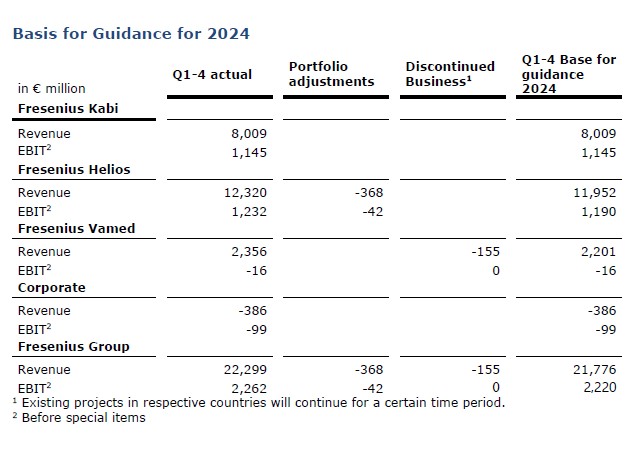
This release contains forward-looking statements that are subject to various risks and uncertainties. Future results could differ materially from those described in these forward-looking statements due to certain factors, e.g. changes in business, economic and competitive conditions, regulatory reforms, results of clinical trials, foreign exchange rate fluctuations, uncertainties in litigation or investigative proceedings, the availability of financing and unforeseen impacts of international conflicts. Fresenius does not undertake any responsibility to update the forward-looking statements in this release.
The Fresenius Group achieved a sound climate-rating from the non-profit organization CDP of B. Further, our joint efforts as a healthcare Group in increasing ESG reporting transparency and coordinated climate-related protection measures resulted in an improved water-ranking of B-. CDP is one of the most renowned climate and environmental rankings in the capital market. Investors use the annual results to evaluate climate protection activities and climate-related risks and opportunities of the companies assessed. As a healthcare Group, we have a special responsibility both to ensure the quality of our products and services, and to protecting health and the environment.
Fresenius has successfully completed the divestment of fertility services group Eugin. As announced in November 2023, global fertility group IVI RMA (a KKR portfolio company) and GED Capital acquired Eugin for up to €500 million including earn-outs. The transaction has received all regulatory approvals.
The divestment marks another milestone in the implementation of #FutureFresenius and is in line with the company’s commitment to a simplified structure, sharper focus and accelerated performance. Furthermore, the sale proceeds will benefit Fresenius’ financial flexibility.
The sale only comprises the Eugin Group. Fresenius Helios' well-established legacy business of fertility treatments in selected hospitals and outpatient centers of Quirónsalud and Helios Germany will remain with Fresenius Helios and continue to offer fertility treatments.
This release contains forward-looking statements that are subject to various risks and uncertainties. Future results could differ materially from those described in these forward-looking statements due to certain factors, e.g. changes in business, economic and competitive conditions, regulatory reforms, results of clinical trials, foreign exchange rate fluctuations, uncertainties in litigation or investigative proceedings, the availability of financing and unforeseen impacts of international conflicts. Fresenius does not undertake any responsibility to update the forward-looking statements in this release.
Pagination
- Previous page
- Page 4
- Next page



